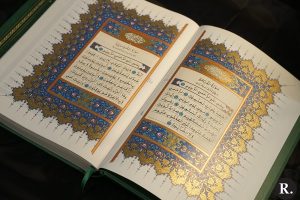
The Review of Religions is pleased to continue our serialisation of the first-ever full English Translation of At-Tafsīr-ul-Kabīr – The Grand Exegesis. This is the magnum opus of Hazrat Mirza Bashiruddin Mahmud Ahmad (ra), Second Worldwide Head of the Ahmadiyya Muslim Community and whilst parts of it have previously been published in other works, such as the five-volume Holy Qur’an with English Translation and Commentary, it has never before been translated in its entirety. Where applicable, this five-volume commentary has also been consulted.
This is one of the most insightful and in-depth commentaries of the Holy Qur’an ever written, and The Review of Religions has the honour to publish it for our English readers for the first time.
By Hazrat Mirza Bashiruddin Mahmud Ahmad (ra) Second Worldwide Head of the Ahmadiyya Muslim Community
Translated by Murtaza Ahmad, edited by The Review of Religions Translation Team
The phrase صِرَاطَ الَّذِينَ أَنْعَمْتَ عَلَيْهِمْ [the path of those on whom Thou hast bestowed Thy blessings], having been added to the words اهْدِنَا الصِّرَاطَ الْمُسْتَقِيمَ [Guide us in the right path], has greatly expanded the meaning of these words. These words show that a Muslim’s purpose is not simply to pray to be shown the straight path for his chosen goals; rather, [these words] set down the principle that he should pray for the highest objectives and request not only that he be shown the right path and be one of the favoured ones, but also to be shown those methods, those teachings and those paths of spiritual knowledge which had previously been bestowed upon the favoured ones of God. By raising such high aspirations among the followers of Prophet Muhammad (sa), God has indeed conferred a great favour upon Muslims.
In the presence of these clear and plain teachings, there remains no need for any further proof that all avenues are open for the personal progress of the Muslims. However, since they have generally given way to despair, it is necessary to turn to the Holy Qur’an to see what it means by the prayer of seeking guidance, and whether the Qur’an has promised the acceptance of this prayer, or not. In Sūrah an-Nisā’, Allah Almighty says:
وَلَوْ أَنَّهُمْ فَعَلُوا مَا يُوعَظُونَ بِهِ لَكَانَ خَيْرًا لَهُمْ وَأَشَدَّ تَثْبِيتًا * وَإِذًا لَآتَيْنَاهُمْ مِنْ لَدُنَّا أَجْرًا عَظِيمًا * وَلَهَدَيْنَاهُمْ صِرَاطًا مُسْتَقِيمًا * وَمَنْ يُطِعِ اللَّهَ وَالرَّسُولَ فَأُوْلَئِكَ مَعَ الَّذِينَ أَنْعَمَ اللَّهُ عَلَيْهِمْ مِنَ النَّبِيِّينَ وَالصِّدِّيقِينَ وَالشُّهَدَاءِ وَالصَّالِحِينَ وَحَسُنَ أُوْلَئِكَ رَفِيقًا
That is, if the weak Muslims should, instead of disobeying, set an example of true obedience and do what is required of them, then the result would be extremely favourable for them; subsequently, their faith would be strengthened, they would earn a great reward from the Heavenly Court and Allah the Almighty would show them to the right path. They should remember that those who obey Allah Almighty and this Messenger, i.e., Muhammad, the Messenger of Allah, peace and blessings of Allah be upon him, are the ones whom Almighty Allah counts among His favoured ones that is among the Prophets, the Truthful, the Martyrs and the Righteous. And these people are excellent companions. [1]
This verse mentions the favours which are ordained for the Muslims. And herein, those very words are used which are found in Sūrah al-Fatiḥah i.e. showing the right path and the right path of the favoured ones. And the favoured ones are explained in terms of the Prophets, the Truthful, the Martyrs and the Righteous. It is evident from this that the lofty divine favours that Sūrah al-Fatiḥah has enjoined upon the followers of Prophet Muhammad (sa) to pray for refers to the most sublime spiritual ranks. And Almighty Allah states all of these will be bestowed on the Muslims.
Some people raise the objection here that the verse found in Sūrah an-Nisā’ is:
مَعَ الَّذِينَ أَنْعَمَ اللَّهُ عَلَيْهِمْ
that is, ‘they would be with those who are the favoured ones’ rather than from among them. Yet, the weakness of this objection is self-evident. For, if the word مَعَ had been used only in relation to the prophets, then it could be said that no prophets would be raised from among the followers of Prophet Muhammad (sa) but, instead, that they would be people who would enjoy the company of the prophets. However, the Holy Qur’an has used the word مَعَ [with] together with أَنْعَمَ اللَّهُ عَلَيْهِمْ[who are the favoured ones].
If, when used in relation to a status, the word مَعَ is taken to mean that this status would not be bestowed on the Muslims and that instead they would only be granted the company of those favoured ones [i.e. the Prophets, the Truthful, the Martyrs, and the Righteous], and not be among them, then this verse would mean that none among the Muslims would be of the favoured ones. Instead, it would mean that only a few people would enjoy the companionship of the favoured ones. However, the Holy Qur’an, Hadith and sound reason all reject this interpretation.
Even if it is said that the object of the preposition مَعَ is actually the description of أَنْعَمَ اللَّهُ عَلَيْهِمْ that is elaborated upon in this verse, then this objection is still obviously false. Because, in this description, four groups – the Prophets, the Truthful, the Martyrs and the Righteous – are mentioned, and if مَعَ means only ‘to be in the company of’, rather than being ‘a member of the group’, then according to this interpretation, the verse would mean that Muslims would not themselves be prophets but would only be in their company; they themselves would not be of the truthful but would only keep their company; they would not be among the martyrs and the righteous themselves but be in their company. This interpretation cannot be further from the truth. What greater slander against the Holy Prophet, may peace and blessings of Allah be upon him, and his followers can there be than the belief that, setting aside the rank of prophethood, no Muslim could ever be among the Truthful, the Martyrs and the Righteous?
Some people object that as prophethood is a مَوْهِبَة mawhibah i.e., something bestowed by Allah, involving no effort on the part of the recipient, so why should one pray for it? The reply to this is that man does not pray for prophethood to be bestowed on him. The followers of Muhammad (sa) pray that God Almighty bestow on them the highest of spiritual favours, and this is the true meaning of this verse. After that, it is up to Allah Almighty to bestow whatever favour upon whomsoever He desires;
اللَّهُ أَعْلَمُ حَيْثُ يَجْعَلُ رِسَالَتَه
[Allah knows best where to place His Message] [2]
Undoubtedly, prophethood is a mawhibah. Why was it then bestowed upon Muhammad, the Messenger of Allah, peace and blessings of Allah be on him, and not upon Abū Jahl? [3] Because even to be the recipient of mawhibah one needs to be selfless and ready to offer sacrifices. Secondly, who claims that a believer has been taught to pray to Allah to attain prophethood? Such prayers are sometimes undesirable and unbecoming even in worldly affairs, let alone religious ones. If a carpenter prayed to Allah that He should make him the principal of a college or if one who is physically disabled prays to Allah that He should make him commander-in-chief of an army, then such prayers would be vain and futile. The acceptance of prayers depends on circumstances and divine wisdom. Thus, it is not befitting for a believer to pray for spiritual ranks by specifically naming them. Even if one prays that Allah make him a ṣiddīq [truthful], a quṭb [saint] or a shahīd [martyr], it would be undesirable, let alone that he should pray to be made a Prophet. For this very reason, Allah Almighty has taught us this prayer using the words اهْدِنَا [guide us], instead of اهْدِنِي [guide me]; for the plural expression indicates collective progress. So from a certain community, Allah Almighty chooses whomsoever He desires for whatever rank of nearness to Himself He wishes to bestow on them. Again, it should also be borne in mind that this prayer is for being granted divine favour. Thus, since prophethood is also a [divine] favour, if this prayer is taken to mean that prophethood should be bestowed on a nation, what is the objection? In short in this prayer, one is taught to pray for all types of favours and to be rightly guided in all matters. The Holy Qur’an says that all these favours will be bestowed on the Muslims and it has itself mentioned prophethood among them. Hence, no one has the right to exclude it from these favours.
Endnotes
- The Holy Qur’an, 4:67-70. [Author]
- The Holy Qur’an, 6:125. [Author]
- Abu Jahl means the Father of Ignorance. His name was ‘Amr bin Hisham and was one of the Chieftains of Makkah during the time of the Holy Prophet of Islam (sa). When the Prophet (sa) began his ministry, ‘Amr bin Hisham became Islam’s staunchest enemy, from then on he was referred to as the Father of Ignorance. He was killed at the Battle of Badr. [Publisher]



Add Comment